Looking for The One, or Just Someone?
What AI Revealed about Dating App Users in the Netherlands and South Korea

They say dating is a numbers game. What if the number was…200? That’s how many people our AI moderator Yasna interviewed about their dating app experiences. Users from South Korea and the Netherlands shared why they use dating apps, what attracts or repels them in profiles, how the apps make them feel, and their views on paying for extra features.

What comes to mind when you think of dating apps? I bet it’s things like “easy, fun, playful, flirty”. Turns out, people use dating apps for reasons that go far beyond finding a partner or a lover. They swipe to cope with loneliness, boost self-worth or even to find travel buddies. And it’s remarkable how differently these motivations show up across the two cultures we studied.
Yasna began by screening participants in the two countries, ensuring only those actively engaged with dating apps proceeded to the interviews.
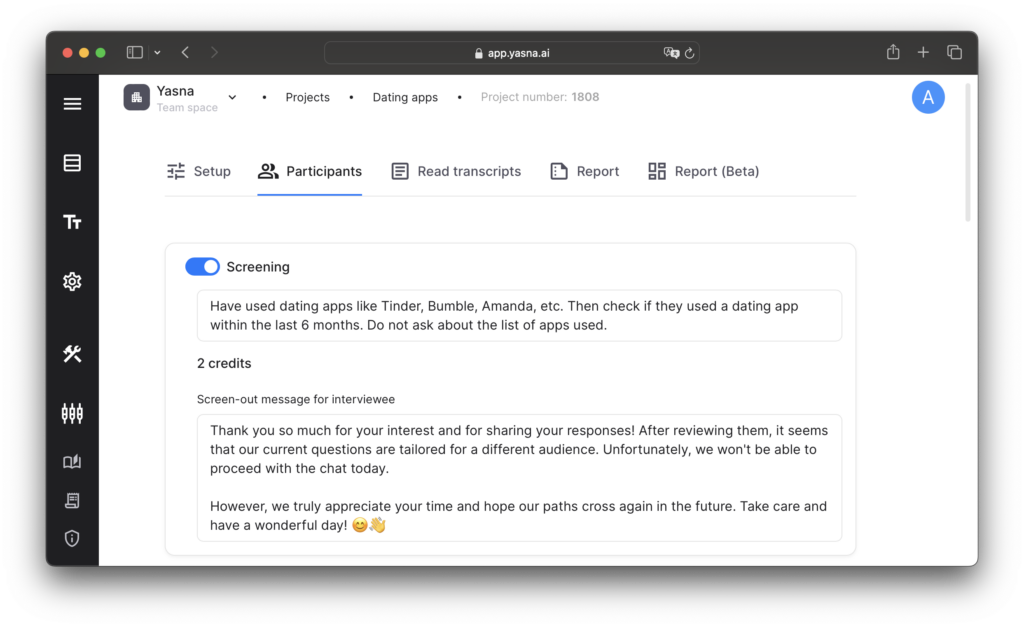
Tinder Takes All. Almost
There is no escaping Tinder. 45% of Dutch users and 36% of South Koreans named it their top choice. Its runner-ups are Badoo (12%) in the Netherlands, and Wippy (10%) in South Korea. Yasna’s analysis confirmed our suspicions: in both countries, the deciding factors for choosing an app are ease of use and a large user base. The more, the matchy-er!
Love Isn’t All They Need: Why People Use Dating Apps
Turns out, not all app users are in it for candlelit dinners. Through Yasna’s interviews, we discovered a mix of intentions — some heartwarming, some unexpectedly practical.
Believe it or not, casual flings aren’t top priorities in either country. Just 11% of Dutch users and 14% of South Koreans say they’re on the apps for short-term fun. Even fewer (5% in the Netherlands and 4% in South Korea) specifically mention looking for a one-night stand.

We’ve noticed that people open up more with Yasna than in face-to-face interviews. So we know they weren’t shy about their real reasons for using dating apps. And if you need proof, have a look at our sex toy case study. A topic much spicier than dating apps and participants didn’t hold back there either!
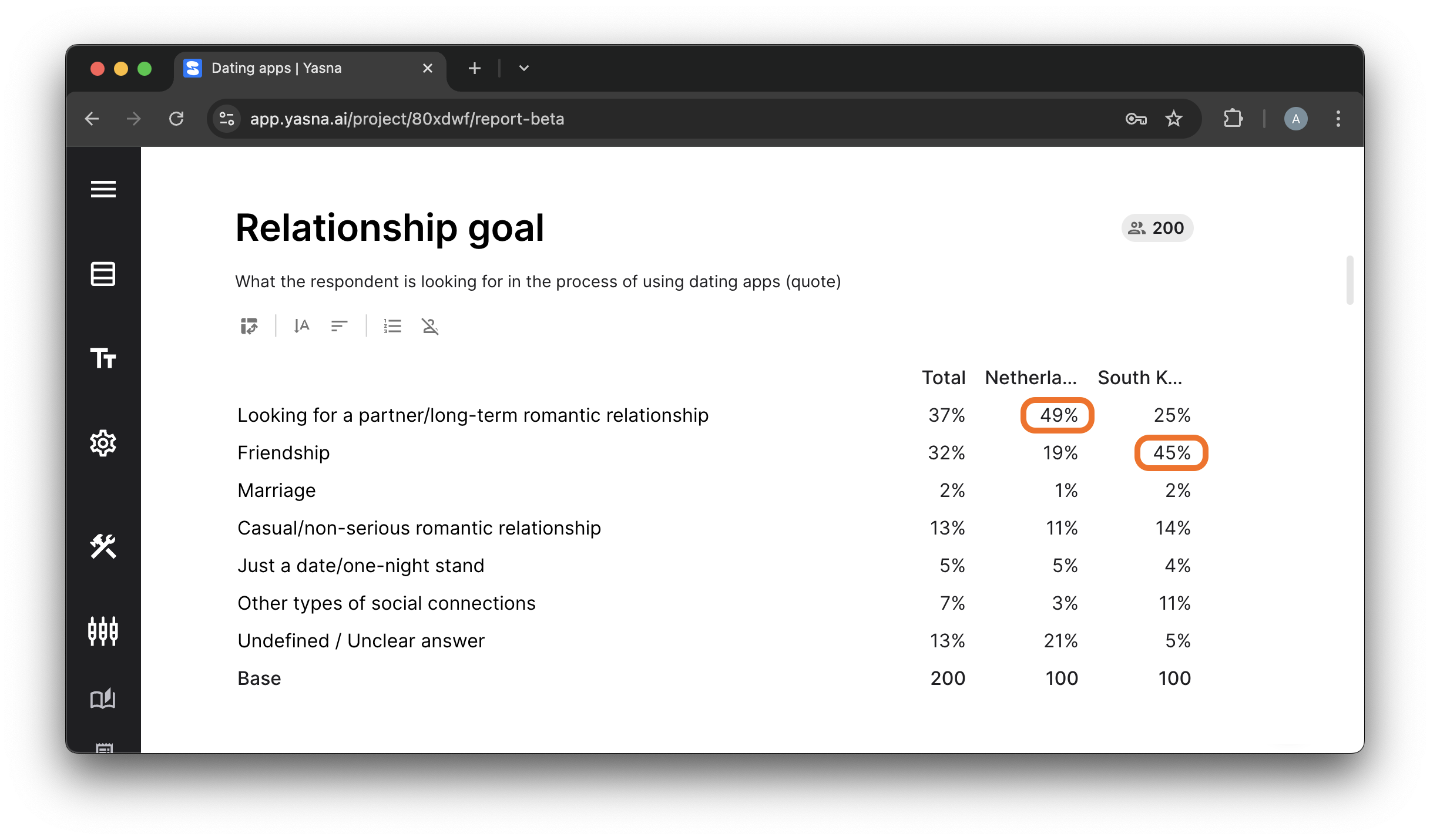
At the same time, there’s a lot of hope for finding a lasting connection — romantic or platonic. In the Netherlands, 49% of users say they’re after a long-term romantic relationship and 19% are looking for friendship. Interestingly, it’s almost the reverse in South Korea: 25% are searching for romance, while a notable 45% turn to dating apps to find a friend.
– Female from South Korea, 37 years old
I like dating apps because I can make friends and talk to people, and it makes me feel less lonely and sad for a while.
What about those practical intentions? South Korean users stood out with goals like language exchange and a search for travel buddies. Neither of these were mentioned by the Dutch, who place more emphasis on self-discovery and validation instead.
– Male from the Netherlands, 24 years old
Of course you hope you find “the one”, but I mainly use it to see if online people I find attractive also find me attractive.
In the Netherlands, Make Them Laugh. In Korea, Make Them Trust You
Looks do matter, but not quite as much as we expected. 65% of Dutch and 54% of South Korean participants said it’s the first thing they pay attention to. However, what holds their attention is a mix of shared interests and a sense of authenticity.
Participants everywhere gravitated toward profiles with natural, unfiltered photos and bios that felt sincere. Ones that gave a glimpse into hobbies, quirks, and personality. Curiously, having hobbies in common was particularly important for men in both countries — something not mentioned by women at all.
Dutch daters are especially drawn to witty, well-written profiles that avoid clichés.
– Female from the Netherlands, 40 years old
I don’t swipe right if the bio feels copy-pasted or overly political. I like witty or funny bios, would love to date someone with a dark sense of humor.
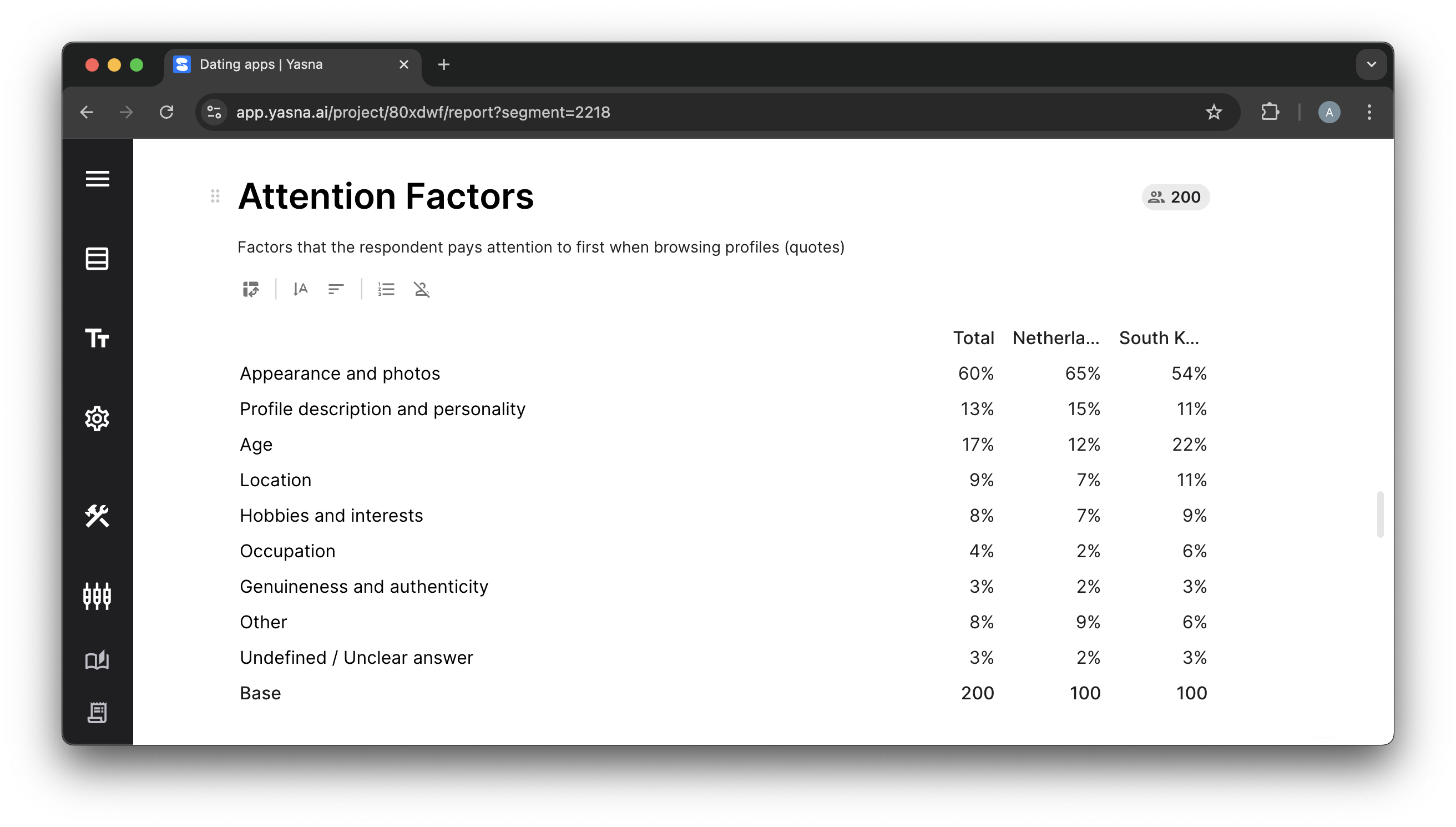
For South Koreans, practical details like location and age matter more. Both of these factors were particularly important for men, less so for women. And then there was the incredibly common issue of fake profiles that don’t just disappoint, but cause financial distress:
– Male from South Korea, 28 years old
The number of fake profiles often left me feeling exhausted, so many try to scam you financially. So I’m interested in profiles that seem honest.
In both countries, authenticity isn’t just appreciated. It’s expected.
Who is paying for love?
When it comes to paying for in-app features, South Korean and Dutch users might as well be on different planets. In South Korea, 30% of users regularly invest in profile boosts and matching upgrades. Men are more likely to pay, viewing premium features as a necessary edge in a competitive dating scene. These purchases are seen as a way to increase visibility, build trust, and improve match outcomes.
– Male from South Korea, 39 years old
I’m on Tinder Platinum and I like that I have a better chance of getting matched than I did when it was free.
Women who do pay for extras mentioned features such as seeing who liked them to spark more diverse interactions, or unlocking detailed profiles to feel safer before meeting someone new.
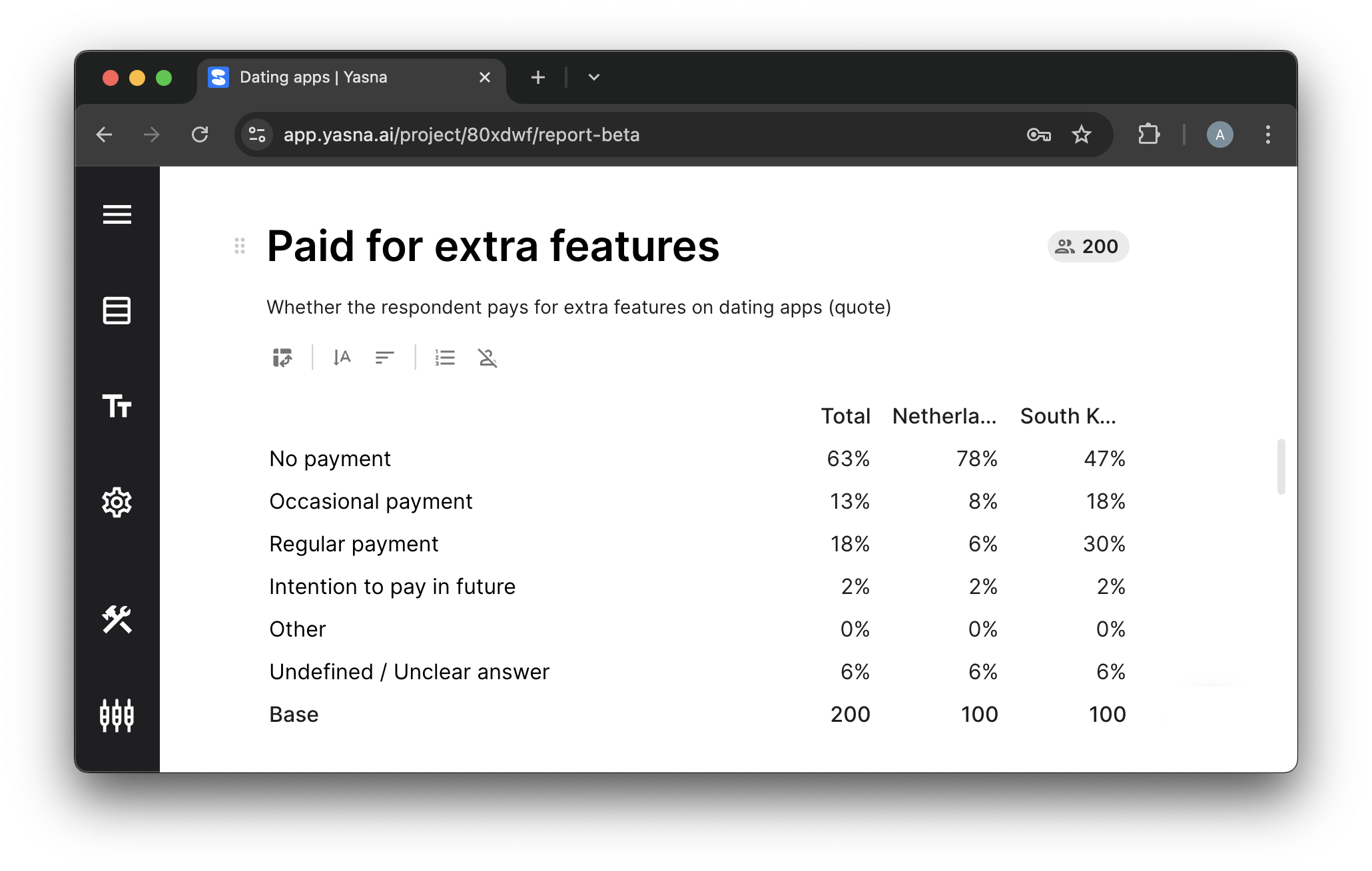
In contrast, both men and women in the Netherlands are far more skeptical about paying for dating apps. 78% opt out entirely, often dismissing premium upgrades as overpriced and unnecessary.
– Female from the Netherlands, 37 years old
Too expensive and gives no added value. I open the app mainly for entertainment when I am bored and so it is not worth the money to me.
Among the 6% who do pay, popular features include the ability to send more messages and use advanced filters. Yasna’s numerical validation makes it clear: a one-size-fits-all monetization strategy won’t work.
Dutch fear rejection, Koreans worry over security
When it comes to dating-app-related feelings, we noticed an interesting pattern. The positive ones are universal across the Netherlands and South Korea. But the negative ones are slightly more country-specific:
Positive Feelings:
Dutch and South Korean users reported feelings of happiness, excitement, and contentment when using dating apps. It’s the thrill of new connections that fuels optimism on both sides.
Negative Feelings:
Frustration, boredom, and disappointment are experienced by users in both countries. However, Dutch users uniquely mention vulnerability as a key emotion, fearing rejection and exposure of personal information. Koreans, on the other hand, report trust issues over faceless interactions. Once again, highlighting the importance of authenticity.
– Male from South Korea, 48 years old
It’s frustrating when you have an idealized person in mind and they’re the exact opposite of your ideal when you meet in real life.
Flaky matches, fake profiles, and hours lost to dead-end chats
These were the top reasons why users in both countries regretted their time spent on the apps. However, each subgroup also brings its own distinct emotional flavor to the table.
In the Netherlands, 23% of users reported outright regret, with another 6% sometimes regretting their use. Financial regret surfaced in this group, with some users frustrated over spending money on features that didn’t enhance their experience. Sexual discomfort also emerged as a concern, with women in particular feeling uneasy about the often overtly sexual tone of some interactions.
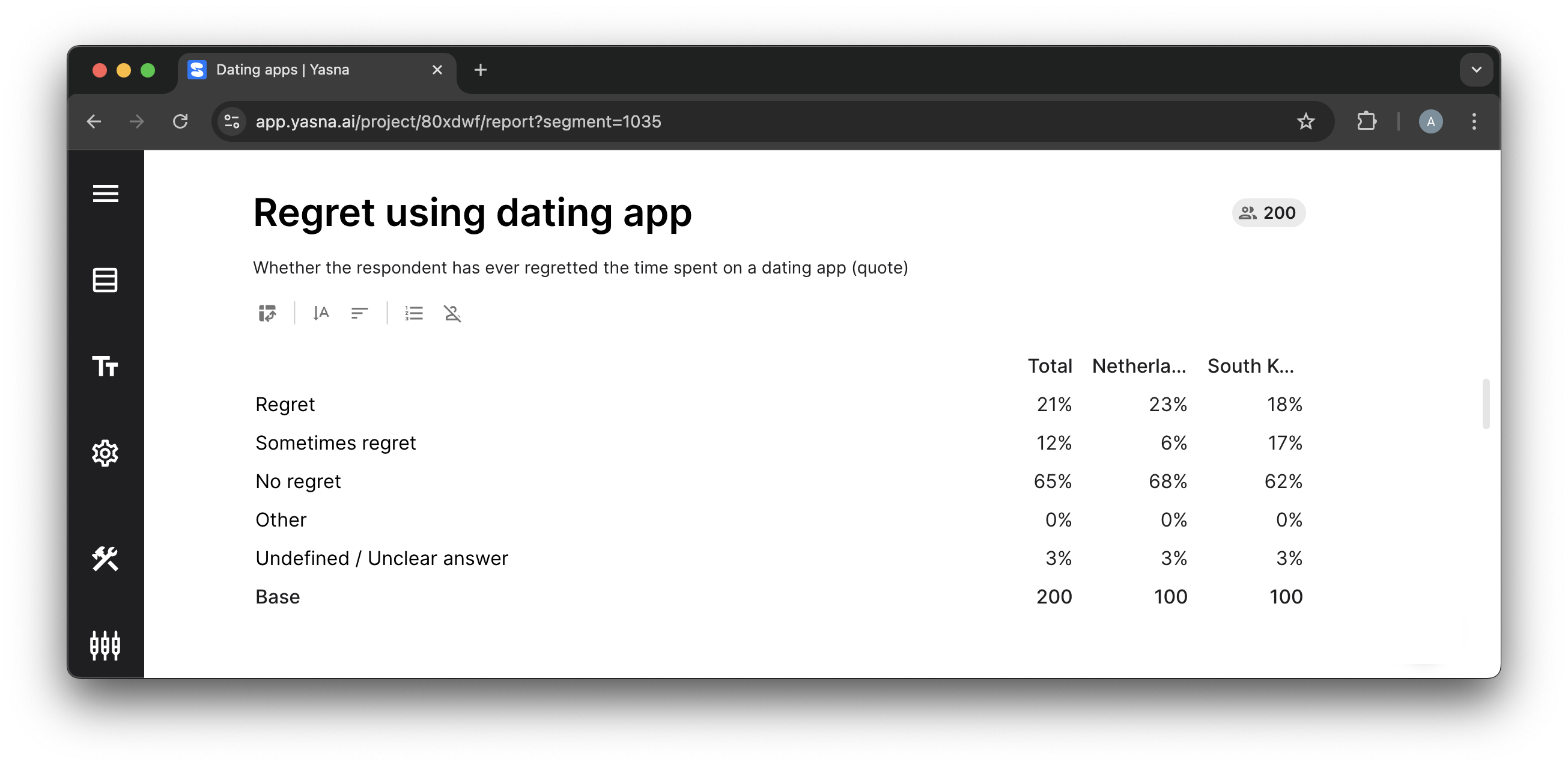
South Korean users, meanwhile, were slightly more forgiving. Only 18% expressed regret, although 17% said they sometimes feel it. Here, external influences like news reports played a role in shaping users’ regret. Some felt increased vulnerability and anxiety due to stories of negative encounters, even if they hadn’t personally experienced them.
Key Takeaways for Brands and Developers
-
Security is key in South Korea. Premium features tied to trust and safety could drive revenue.
-
Both countries value authenticity. Apps could enhance profile customization with humorous prompts and engaging bios.
-
Friendship-based interactions are growing. Features supporting social connections could gain traction, particularly in South Korea.
-
Addressing user frustration with misleading profiles could reduce regret and improve satisfaction across both markets.
Why Yasna?
Yasna engages with users in their native languages (45+ available), adapts to each answer, and asks tailored follow-ups to uncover real motivations, providing a rich understanding of users. With Yasna analyzing hundreds of conversations, you can make smarter, culturally savvy decisions that actually speak to your audience.




